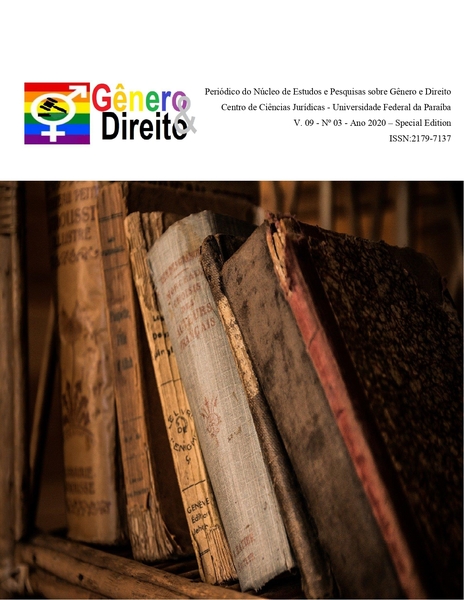POLITICAL-LEGAL ISSUES OF FULFILLMENT OF RUSSIA’S INTERNATIONAL OBLIGATIONS ON DEATH PENALTY ABOLITION IN THE COUNTRY
DOI:
https://doi.org/10.22478/ufpb.2179-7137.2020v9n03.51723Palavras-chave:
international law, death penalty, national law in RussiaResumo
the research topicality is due to the necessity to anchor the humanistic values in the Russian public conscience, especially among the youth. One of these values is the human right to life. The previous sociological polls, referring to the Russian citizens’ attitude to legitimate coercion of the state as its right to deprivation of life, showed the high but gradually decreasing level of support of death penalty. The processes of integration with the global culture, the reforms of the social-political and legal systems of the recent decades caused the increase of the level of humanism in Russia. Thus, the present research is aimed at applying empirical methods to reveal the political reasons of inconsistency between the Russian international obligations to abolish the death penalty and the national law-making practice, the above inconsistency being in place for over two decades. The leading research method was the content analysis of the legal and public information, which allowed the comprehensive examination of the processes of humanization of the political-legal conscience in Russia. The article presents the sources of international law, the result of polling the Russian citizens, and the revealed interconnections between the law-making processes and the internal policy of the authorities taking into account the public agenda. The authors assert the relation between the public policy pursued by the authorities for preserving the death penalty in the country, and the number of its proponents, which is decreasing, though slowly. The authors conducted a sociological poll on the attitude of young people, university students, to applying the death penalty in the country. The poll results substantiate the conclusions on the increasing trend of humanization of the young Russians’ public consciences, which is related to their education level: the majority of those supporting the death penalty for grave crimes are the first-year students; those inclined to recognize the right to life by rejecting the death penalty in the country are mostly senior students. The materials of the article are of practical value for specialists in the sphere of international relations, education, national and foreign affairs of national states.
Downloads
Referências
Hobbes, Th. Leviathan or The Matter, Forme and Power of a Common-Wealth Ecclesiastical and Civil. Works in 2 vol. Moscow: Mysl, 1991, vol. 2. – 733 p.
Gumplowicz L. General doctrine of state. Saint Petersburg. 1910. – 516 p.
Jhering, R. Law as a Means to an End. – Saint Petersburg. 1881. – 387 p.
Kudryavtsev V. N. Conflict and violent crime. – Moscow: Nauka, 1991. – 172 p.
Foucault, M. Discipline and Punish: The Birth of the Prison. - Moscow: Ad marginem, 1999. – 450 p.
Weber, M. Selected works. ‒ Moscow: Progress, 1990. – 804 p.
Beccaria, C. On crimes and punishments. Compilation and foreword by V. S. Ovchinskiy. ‒ Moscow: INFRA-M. 2004. ‒ 184 p.
Kistyakovskiy A. F. Research on death penalty. ‒ Tula: Avtograf, 2000. Reproduction of 1867 edition, Kiev. ‒ 272 p.
Romanovskiy G. B. Right to life (general theoretical aspect). Legal Studies. - Saint Petersburg: Saint Petersburg University Publishers, 2003, No. 4. - pp. 180-190.
Levitskiy G. A. Russian and west European scholars of the 19th and beginning of the 20th cc on criminal law, crime and punishment. Reader. – Saint Petersburg: 2004. – 152 p.
Piontkovskiy A. A. Death penalty in Europe. ‒ Kazan: Typolithography of Imperial University, 1908. – 124 p.
Liu Tianlai. Punishments, alternative to death penalty, applied in Russia and China (comparative-legal research). Proceedings of Crimean Federal University named after V.I. Vernadskiy. Juridical Sciences. – 2015. – No. 1. – pp. 162-166.
Protocol No. 6 to the Convention for the Protection of Human Rights and Fundamental Freedoms concerning the abolition of death penalty ETS No. 114 (Strasbourg, 28 April 1983) (with amendments and additions). URL: GARANT System: http://base.garant.ru/2540804/#ixzz4cDjkoC2G (access date 24.12.2017).
Criminal Code of the Russian Federation of 13.06.1996 No. 63-FZ (edition of 07.03.2017) URL: http://www.consultant.ru/document/cons_doc_LAW_10699/adad84c3db53a9f9b7baf3187fc7ad830785dc4f/ (access date 24.12.2017).
Constitution of the Russian Federation. URL: http://www.consultant.ru/document/cons_doc_LAW_28399/ (access date 24.12.2017).
Constitutional Court of the Russian Federation. Decision of 2 February 1999 No. 3-p. URL: http://main-law.ru/ksrf/3-p_ot_02-02-1999 (access date 24.12.2017).
Constitutional Court of the Russian Federation clarified the issue of the possibility to apply death penalty in connection to the introduction of jury trial on the whole territory of the Russian Federation. Constitutional Court of the Russian Federation of 19.11.2009 No. 1344-О-Р URL: http://www.consultant.ru/law/hotdocs/7741.html (access date 26.12.2017)
Kolokoltsev: There is nothing reprehensible in death penalty. Interfax. 10.02.2013 URL: http://info.vedomosti.ru/newsline/news/2013/02/10/8922691 (access date 26.12.2017).
Threat of death penalty. Aleksandr Bastrykin proposes to preserve in the Criminal Code. 30.05.2014. URL: https://zakon.ru/(X(1)S(lr4jnfjcfaaowgbdjyb0lk3k))/discussion/2014/5/30/ugroza_smertnoj_kaznyu__aleksandr_bastrykin_predlagaet_soxranit_ee_v_ugolovnom_kodekse?AspxAutoDetectCookieSupport=1 (access date 26.12.2017).
Head of Ossetia proposed to execute terrorists. 30.12.2013. URL: https://rg.ru/2013/12/30/reg-skfo/nakazanie.html (access date 26.12.2017).
Kadyrov urged to introduce death penalty fro terrorists. Lenta.ru. 15 October 2015. URL: https://lenta.ru/news/2015/10/15/kadyrov/ (access date 26.12.2017).
Ministry of Justice appeased the Russians: they are out of the reach of death penalty, even if the country is excluded from the PACE. Date of publication: 8 April 2014. URL: http://www.newsru.com/russia/08apr2014/pasenokazn.html (access date 26.12.2017).
Attitude to death penalty. The Russians on the death penalty and moratorium on its application. URL: http://fom.ru/TSennosti/11722 (access date 05.01.2018).
Kuzina S. I. Political coercion: nature, manifestation and dynamics in the globalizing world: Doctoral (Political Studies) dissertation. Rostov-on-Don, 2011. 368 p.

